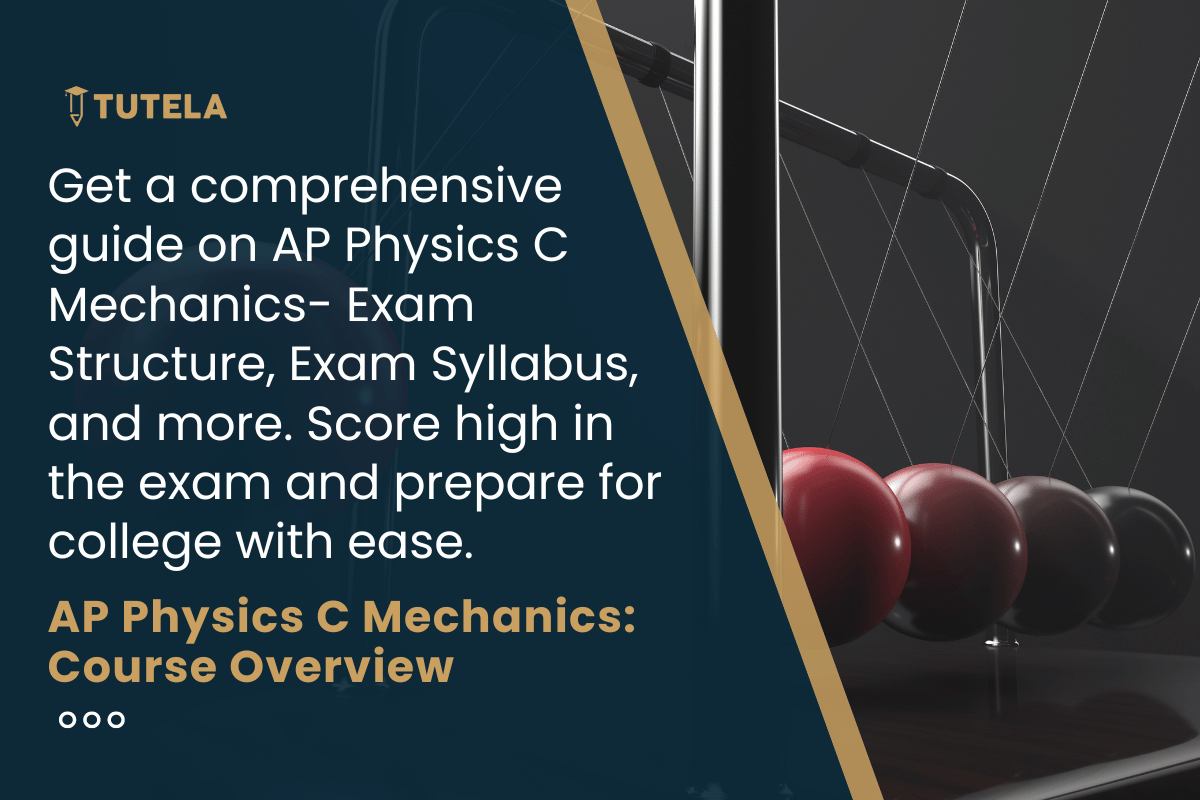
Welcome, physics enthusiasts, to a thrilling exploration of AP Physics C: Mechanics! Whether you're preparing for the AP exam or just passionate about unraveling the mysteries of classical mechanics, you're in for an enlightening journey.
In this blog, we aim to be the student's go-to guide, breaking down the entire syllabus of AP Physics C: Mechanics in a concise and engaging manner. From fundamental principles to advanced concepts, we'll navigate the intricacies of classical mechanics. The AP Physics C: Mechanics Exam is scheduled for 14th May 2024.
| Unit Name | Description | Weightage in the Exam |
| Unit 1: Kinematics | The journey begins with kinematics, exploring the description of motion. Concepts include displacement, velocity, acceleration, and the equations that tie them together. Through calculus, students delve into understanding motion in one and two dimensions. | 14-20% |
| Unit 2: Newton’s Laws of Motion | This unit takes the students to the heart of classical mechanics—Newton's laws. From the fundamentals of force and mass to the intricacies of circular motion and gravitation, students gain insights into the principles governing the dynamics of objects. | 17-23% |
| Unit 3: Work, Energy, and Power | The third leg of our journey involves the concepts of work, energy, and power. From the work-energy theorem to potential and kinetic energy, students learn to analyze and calculate the mechanical energy of a system. | 14-17% |
| Unit 4: Systems of Particles and Linear Momentum | Unit 4 expands the student's understanding of systems of particles and the crucial concept of linear momentum. Conservation laws take the spotlight, exploring how interactions within a system can be described and predicted. | 14-17% |
| Unit 5: Rotation | Circular motion and rotation step into the limelight in this unit. Through angular quantities and rotational dynamics, students discover how objects move in circular paths and how torque influences their motion | 14-20% |
| Unit 6: Oscillations | The rhythmic dance of oscillations becomes our focus in this unit. From simple harmonic motion to springs and pendulums, students explore the behavior of systems undergoing repetitive motion. | 6-14% |
| Unit 7: Gravitation | The Unit covers Newton's law of universal gravitation, gravitational fields, and potential energy. The unit also introduces gravitational potential energy changes and applies these principles to analyze planetary motion using Kepler's laws. Overall, it offers a concise exploration of gravity's fundamental principles and their application to the dynamics of celestial bodies. | 6-14% |
The AP Physics C Mechanics exam for 2024 is structured as follows:
1. Multiple-choice section: This section consists of 35 questions and lasts for 45 minutes. It covers various topics, including kinematics, Newton's Laws of Motion, work, energy, power, systems of particles and linear momentum, circular motion and rotation, and oscillations and gravitation
2. Free-response section: This section consists of 3 questions and lasts for 45 minutes. Each question will include an experimental or lab-based component, and they will assess all 7 of the science practices, such as visual representations, questions, and methods, representing data and phenomena, data analysis, theoretical relationships, mathematical routines, and argumentation
The knowledge gained from AP Physics C: Mechanics opens doors to various majors and fields. Whether you're intrigued by engineering, physics, or a related discipline, this course equips you with a solid foundation.
1. Physics and Astrophysics: Mechanics lays a solid foundation for students pursuing majors in physics and astrophysics, providing essential principles for understanding the fundamental laws governing the universe.
2. Mechanical Engineering: With a focus on mechanics, the course aligns perfectly with the curriculum of mechanical engineering majors, offering a comprehensive understanding of forces, motion, and energy.
3. Civil Engineering: Understanding structural mechanics is crucial in civil engineering, making AP Physics C: Mechanics beneficial for students aspiring to contribute to the design and construction of infrastructure.
4. Aerospace Engineering: Those aiming for careers in aerospace engineering benefit from the course's coverage of mechanics, which is fundamental to the design and operation of aircraft and spacecraft.
5. Computer Science and Engineering: The analytical and problem-solving skills developed in AP Physics C complement the requirements of computer science and engineering majors, contributing to success in software and hardware development.
6. Electrical Engineering: Concepts of motion and forces are applicable in electrical engineering, making the course valuable for students interested in understanding the behavior of electrical systems.
7. Applied Mathematics: The integration of calculus in AP Physics C provides a strong mathematical background, beneficial for students pursuing majors in applied mathematics, where mathematical modeling is essential.
8. Biomechanics: For those interested in the intersection of physics and biology, particularly in understanding the mechanics of living organisms, AP Physics C: Mechanics provides relevant insights for biomechanics majors.
9. Materials Science: Mechanics plays a crucial role in materials science, and students exploring this field can benefit from the foundational knowledge offered in AP Physics C.
10. Environmental Engineering: The course's focus on forces and energy is relevant to environmental engineering, where understanding the impact of human activities on the environment is essential for sustainable practices
TutelaPrep’s College Navigator allows students to search for colleges based on their preferred country and course. Not only that, it also provides valuable insights into each college’s specific admission requirements for those exams. Through College Navigator, you can even connect with alumni at your chosen colleges to get a firsthand feel for campus life and academics.
We hope this article helped you with the subject knowledge. Reach out to us by filling out our assistance form if you need any help with the preparations.